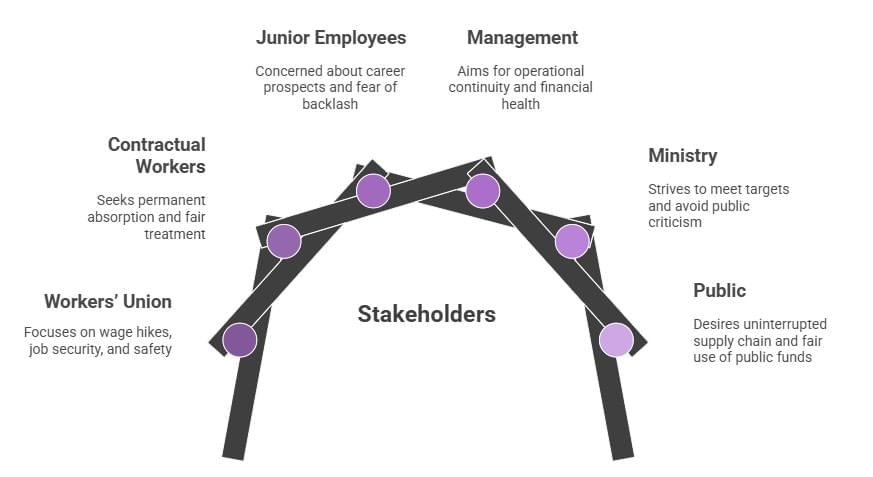July 14 – GS4/Ethics: 2026 | UPSC Daily Answer Writing Practice PDF Download
Case Studies
Q: You are posted as the General Manager of a large public sector manufacturing unit. Recently, tensions have escalated between the management and the workers’ union. The union has raised demands regarding increased wages, better safety standards, and permanent absorption of contractual workers.
While some of their demands are legitimate and align with labour welfare norms, others may have a severe impact on the company's financial health. Moreover, you discover that a few influential union leaders are instigating workers to go on an indefinite strike, even though negotiations are still ongoing.
Meanwhile, a group of junior employees approaches you confidentially, expressing concern that the aggressive approach of the union may harm their career prospects and lead to a prolonged factory shutdown. At the same time, pressure mounts from the Ministry to avoid disruptions and meet production targets crucial for national supply chains.
In the midst of this, a senior union leader offers to de-escalate the situation in exchange for personal favors, such as awarding contracts to firms linked to him and ensuring his relatives receive preferential treatment in job promotions.
You are expected to submit a report to the Ministry suggesting a path forward that ensures industrial peace, protects workers’ rights, and prevents unethical compromises.
(A) Identify and discuss the ethical issues involved in this case.
(B) How would you balance worker welfare with organizational sustainability and public interest?
(C) How should you respond to the offer made by the union leader? What mechanisms should be used to ensure transparency and accountability?
(D) What ethical values and principles of public administration should guide your conduct? (250 words)
Introduction
As the General Manager of a public sector manufacturing unit, I am facing a challenging situation that involves legitimate labour unrest over welfare demands, unethical behavior by a senior union leader, pressure from the Ministry for production continuity, and concerns from junior employees about prolonged conflict. My challenge is to reconcile these competing interests ethically while ensuring industrial harmony.

(A) Ethical Issues Involved
- Conflict of Interest and Corruption: The proposal of personal favors by a union leader in exchange for reducing protests is a clear case of quid pro quo, violating integrity and probity in public service.
- Fairness and Equity: The permanent absorption of contractual workers and wage revision raises concerns about fairness versus financial prudence.
- Pressure from Stakeholders: Balancing the conflicting expectations of workers, junior staff, management, and the Ministry puts pressure on ethical neutrality.
- Transparency and Trust: The aggressive tactics employed by union leaders erode mutual trust, while the concerns of junior employees highlight issues of voice and representation.
(B) Balancing Worker Welfare with Organizational Sustainability and Public Interest
Assess Demands Objectively:
- Implement a three-tier evaluation of demands:
- Legitimate and feasible (e.g., improved safety standards).
- Ethically valid but financially challenging (e.g., permanent absorption of contract workers).
- Unsustainable or unfair (e.g., disproportionate wage hike demands).
Open and Inclusive Dialogue:
- Establish a tripartite negotiation mechanism involving the union, junior staff representatives, and management.
- Ensure transparency by recording and minuting the negotiation process.
Worker Welfare with Financial Discipline:
- Explore phased implementation of feasible demands, such as gradual wage revisions or skill-based promotions.
- Invest in long-term welfare initiatives like training, upskilling, and improved working conditions that align with both employee welfare and productivity.
Protect Public Interest:
- Ensure minimum operational continuity to meet national supply commitments through voluntary workforce or alternative arrangements.
- Propose temporary Memorandums of Understanding (MoUs) or arbitration to defer strikes while negotiations are ongoing.
(C) Response to the Unethical Offer
- Immediate Rejection: Firmly refuse the unethical offer, highlighting commitment to ethical conduct and zero tolerance for corruption.
- Document and Report: Keep a confidential record of the incident and report it to the internal vigilance department and the Ministry.
- Initiate Disciplinary Inquiry: Seek legal and disciplinary action against the involved union leader to uphold the rule of law.
Mechanisms for Transparency and Accountability
- Constitute a Grievance Redressal Committee with representation from all worker categories and an independent observer.
- Utilize external mediators or industrial tribunals for impartial settlement of complex demands.
- Mandate public disclosure of agreements, timelines, and audit trails of resource allocation.
- Deploy digital dashboards for real-time updates on negotiations and implementation progress.
(D) Ethical Values and Principles to Uphold
- Integrity: Reject personal benefits that compromise public trust.
- Impartiality: Treat all stakeholders—senior union leaders, junior staff, contract workers—with fairness.
- Accountability: Ensure decision-making is open to scrutiny by higher authorities and the public.
- Empathy and Responsiveness: Listen to the concerns of vulnerable junior employees.
- Rule of Law: Uphold labour laws, anti-corruption frameworks, and administrative ethics.
Conclusion
As Immanuel Kant wisely stated, "Act only according to that maxim whereby you can at the same time will that it should become a universal law." This principle of duty-bound ethics should guide my actions, ensuring that decisions are morally sound, universally applicable, and rooted in integrity.
FAQs on July 14 – GS4/Ethics: 2026 - UPSC Daily Answer Writing Practice
| 1. What is the significance of ethics in the GS4 paper of the UPSC examination? |  |
| 2. What are the key topics covered under the Ethics syllabus for the UPSC examination? |  |
| 3. How can candidates prepare effectively for the Ethics paper in the UPSC exam? |  |
| 4. What is the role of case studies in the Ethics paper, and how should candidates approach them? |  |
| 5. How does the Ethics paper contribute to the overall assessment in the UPSC examination? |  |















